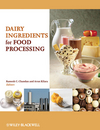Dairy Likely Not Related to Heart Disease

It found that some components in dairy products might even render some protective effect.
Researchers from Brown University analyzed data from thousands of Costa Rican adults and found that their dairy consumption had no statistical relevance to their risk of heart attack.
“Things like milk and cheese are very complex substances,” said lead author Stella Aslibekyan.
“We looked at [heart attack risk and] dairy products in their entirety and then looked at separate components of those dairy products, including fats, and it turns out that the results are null. Perhaps the evidence is not there,” she added.
Aslibekyan and co-author Ana Baylin analysed data on 3,630 middle-aged Costa Rican men and women who participated in an epidemiological study between 1994 and 2004 by co-author Hannia Campos of the Harvard School of Public Health.
They split the study population between two equal groups: 1,815 “cases” who had non-fatal heart attacks and 1,815 comparable “controls” who did not.
They looked not only at the subjects’ self-reported dairy intake, but also at measurements of dairy fat biomarkers, namely 15:0 and 17:0, in their bodies.
What they found is that the dairy intake of people who had heart attacks was not statistically different than the intake of people who did not.
When the researchers controlled for such risk factors as smoking, waist-to-hip ratio, alcohol intake, and physical activity, the lack of a statistically significant association between dairy intake and heart attack risk remained.
They also tracked and adjusted the data for levels of CLA and calcium and found they may have a protective effect. Protective effects lessened in the highest quintile, however.
The study is published in advance online in the journal Nutrition, Metabolism and Cardiovascular Diseases.
From the May 20, 2011, Prepared Foods' Daily News.
Looking for a reprint of this article?
From high-res PDFs to custom plaques, order your copy today!





